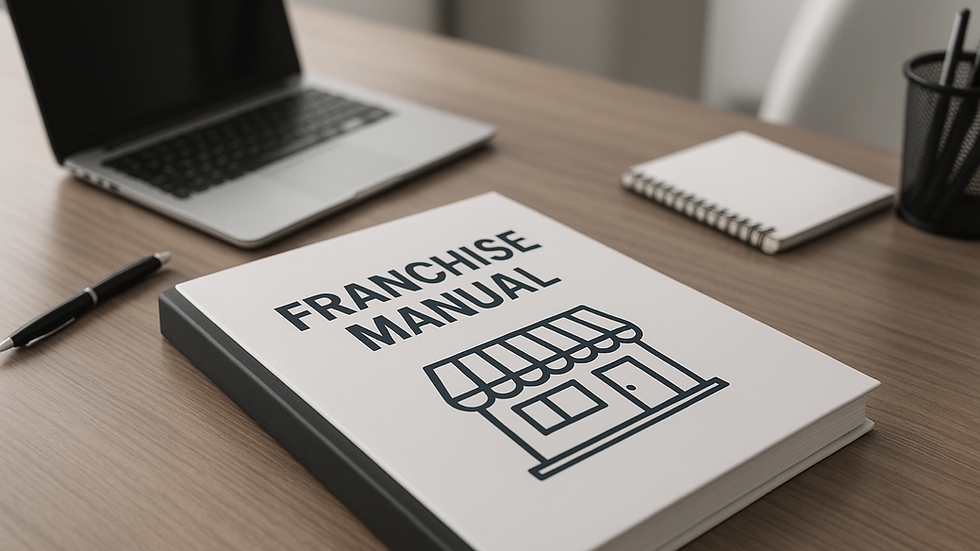The Missing Franchise Manual Wasn’t a Mistake
- Whelan Lawyers

- Jul 23, 2025
- 3 min read
Updated: Sep 10, 2025
Why Holding Back the Franchise Manual Could Undermine Your Entire Agreement
They weren’t new to franchising. This franchise brand had already expanded nationally, with a strong network of franchisees and a reputation for operational excellence.
The Franchise Agreement and Disclosure Document? Issued properly.
The Franchise Manual? Held back. On purpose.
"We don’t share the manual until after signing, it contains our IP, supplier lists, recipes, fit-out specs, etc.”
Sound familiar?
They’re not the only ones. Many franchisors, even seasoned ones, take this approach.
It’s not an oversight... It’s a strategy. But from a legal perspective, it’s a precarious one.

What Happened Next
Twelve months in, the franchisee was struggling.
Sales were below expectations. The business wasn’t failing, but it wasn’t thriving either.
The franchisor grew concerned. After repeated check-ins, they moved to enforce performance KPIs: minimum monthly revenue and customer satisfaction scores, or face being breached.
The franchisee pushed back. “These targets were never discussed. They’re not in the franchise agreement. They weren’t in the disclosure documents.”
The franchisor pointed to the manual. The franchisee pointed to their inbox.
No manual before signing. No opportunity to review. Just a clause saying they'd be “bound by the manual as updated from time to time.”
The Legal Reality
If the manual is:
Incorporated by reference in the Agreement and considered contractually binding with the ability to breach or terminate; and
Contains substantial obligations (e.g. marketing rules, fit out upgrades); or
Financial obligations (supply chain restrictions, minimum stock levels, marketing levies, ability to change fees);
Performance benchmarks (KPI's);
Territorial restrictions,
which have not been disclosed elsewhere (i.e. the Agreement or Disclosure Document)...
It’s not just an operations manual. It's a contractual reference point, and withholding it may breach your obligations.
The Competition and Consumer Act 2010 (Cth) (and corresponding case law interpretations) requires a party to provide "material facts" that would influence a reasonable person's decision to enter into a contract. Key contractual requirements buried in an undisclosed manual could easily fall into this category.
The franchisee may argue they weren't given adequate information to make an informed decision. The ACCC may take notice. And critically, you may lose the ability to enforce what's in the manual at all.
Confidentiality Catch 22
Franchisors often fear that sharing the manual too early will expose them to IP theft or misuse, but once the franchisee is receiving documents for the 14-day holding period, franchisees have gone through a rigorous vetting process and also paid deposits (sometimes more than one) and perhaps incurred their own costs (registering companies etc), making the chances of that occurring low.
Here’s the thing: You can and should protect your IP without breaching the Code.
You don’t need to hand over the recipe or your supplier list on day one. But you do need to provide enough to clearly disclose what the franchisee is expected to comply with.
How to Mitigate the Risk
Audit your disclosure package. If your agreement references the manual as binding, include the relevant operational sections in your 14-day disclosure materials.
Avoid vague incorporation clauses. Generic clauses like "franchisee agrees to comply with the operations manual as amended" won't protect you if key obligations weren't properly disclosed.
Document your disclosure process. Keep delivery records. Maintain clear records of what was provided, when, and confirmation of receipt.
Implement robust confidentiality protocols. Confidentiality agreements protect your IP while keeping you compliant with disclosure requirements. Provide a password-protected manual.
Separate trade secrets from operational requirements. Franchisees need to understand their obligations; they don't necessarily need your proprietary processes. Provide operational summaries covering mandatory requirements without revealing trade secrets.
Consider whether an obligation is better suited in the franchise agreement instead of the franchise manual.
A Final Word
Franchising is built on trust, transparency, and compliance.
If the manual contains obligations a franchisee is expected to follow, then withholding it isn’t protecting your business; it’s undermining it.
Franchisors can’t have it both ways.
You can’t enforce what's in the manual if the franchisee never saw it before signing. And no amount of confidentiality concern will undo the legal exposure if the ACCC, or a court, decides the disclosure was incomplete.
The strongest franchise systems aren't built on information asymmetry; they're built on clear expectations, proper disclosure, and mutual trust from day one.
So what happened between that franchisor and franchisee, you might wonder?
Like most commercial disputes, they resolved it privately. But the franchisor had to give concessions to bring the franchisee in line... the legal fight simply wasn’t worth it.
The longer-term consequence? The franchisee spotted a weakness in the franchisor’s armour. And once that dynamic shifts, it’s hard to undo.
Friendly heads-up: This article isn’t legal advice. It’s general information only and doesn’t take into account your specific circumstances. If you're a franchisor (or planning to become one), get tailored legal advice before acting on anything discussed here.


